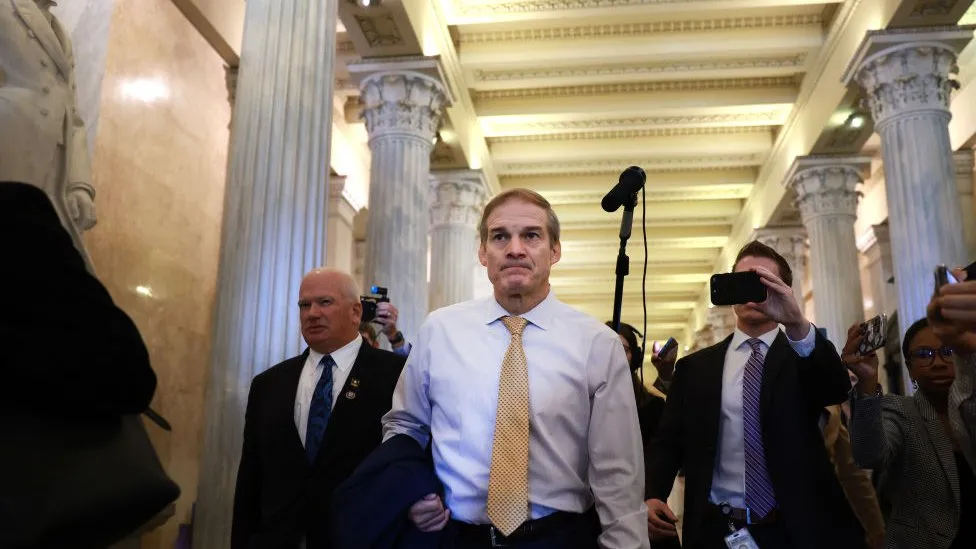Speaker of the House has taken a dramatic turn as Representative Jim Jordan, vying for the position, finds himself in a precarious situation, unable to afford the loss of more than four Republican votes in a chamber where his party maintains a slim majority, with a count of 221-212. Originally scheduled for Tuesday, the second vote has now been rescheduled for Wednesday at 11:00 (15:00 GMT). What makes this contest particularly intriguing are the unexpected alliances and choices made by fellow Republicans: some opted for Kevin McCarthy, the former Speaker, while others threw their support behind alternative candidates. In an extraordinary twist, three even cast their votes for Lee Zeldin, a retired New York congressman. Notably, a group of New York Republicans opposed Mr. Jordan, citing his stances on a range of political issues, including his position on benefits for survivors of the 9/11 attacks. This unfolding drama within the Speaker race underscores the high-stakes nature of the struggle for leadership in the House of Representatives.

A Last-Minute Challenge to Kevin McCarthy
In an unexpected twist, Representative Jim Jordan of Ohio has entered the race for Speaker of the House, posing a formidable challenge to frontrunner Kevin McCarthy. Jordan’s eleventh-hour candidacy has created a significant rift within the Republican conference and could lead to a protracted leadership battle with far-reaching consequences for the upcoming congressional session.
A Closer Contest Than Anticipated
Initially, it appeared that Kevin McCarthy, the current House Minority Leader, would have an unobstructed path to the Speakership, given his backing from the Republican establishment. However, Jim Jordan’s entry into the contest has galvanized the conservative base, resulting in a much closer first vote than expected. In Tuesday’s ballot among House Republicans, McCarthy secured 188 votes to Jordan’s 131, falling short of the 218 votes required for victory on the House floor.
What You Need to Know About Jim Jordan
Jim Jordan, a founding member of the conservative House Freedom Caucus, is renowned for his unwavering support of former President Donald Trump during both of his impeachment trials and his promotion of false claims of election fraud in 2020. This has earned him a dedicated following among the GOP base but alienated moderate Republicans. Before serving in Congress, Jordan was a wrestling coach and a politician in the Ohio State Legislature. His combative style and media-savvy approach have elevated his national profile within the party. Currently, he serves as the top Republican on the Judiciary Committee, where he has scrutinized President Biden’s decisions on issues such as the Afghanistan withdrawal and COVID-19 origins.
The Impact on Republican Unity
Jim Jordan’s candidacy has brought long-standing tensions within the House GOP to the forefront. McCarthy’s supporters argue that he can better unite the broader Republican conference and appeal to independent-minded members, but Jordan has the backing of the influential Freedom Caucus bloc. The contest reflects broader conservative dissatisfaction with what they perceive as leadership concessions on key issues, including McCarthy’s refusal to remove Representatives Liz Cheney and Adam Kinzinger from the conference and his recent deal to raise the debt ceiling temporarily. Jordan and other conservatives contend that the current leadership is too willing to compromise with Democrats, and his bid for the Speakership allows this faction to voice their grievances directly.
The Battle for Support Speaker of the House
With the first vote so closely contested, both candidates are under pressure to solidify their support before the second round on Wednesday. Jordan is actively lobbying McCarthy backers who might be open to switching their allegiance, while McCarthy is working to prevent further defections from his camp. Undecided members with significant followings on the right, such as Representatives Marjorie Taylor Greene and Matt Gaetz, could play a pivotal role in determining the outcome. Several moderate Republicans who abstained or voted “present” on Tuesday may also sway the results depending on their alignment in the second vote.
A Protracted Leadership Battle
The ongoing Speaker race has left the House without a fully functioning Speaker, leading to a legislative standstill. Both candidates insist they are making progress toward the 218 votes required for victory, but if the margin remains narrow after Wednesday’s vote, additional ballots may be necessary, further exacerbating the GOP’s internal divisions and potentially harming the party’s prospects heading into the 2024 elections. The high-stakes battle for the Speakership lays bare the Republican Party’s ideological struggles, with significant implications for its future direction in the next Congress.
